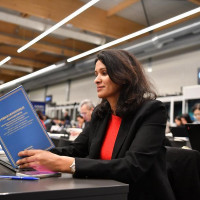- Thursday, 26 February 2026
Intelligence's Role In Foreign Policy
The concept that foreign policy is fundamentally an extension of domestic policy has become firmly embedded in the national structure over the years. It is a fact that strength abroad only comes from strength at home. Building an effective, sound, and result-oriented foreign policy demands a strong domestic foundation.
The technological and scientific revolution has unbelievably transformed the nature of global politics and economics. The world is interconnected than ever before. As information, which travels instantaneously, cutting across people, borders and nations, and artificial intelligence (AI) and open-source intelligence (OSINT) permeate not only our daily routines, including thoughts, preferences, and choices, but also leaders get evaluated every moment through online comments, polls and social media. We need to remain acutely aware that a single misstep can lead to a widespread public backlash.
Political boundaries
Technology transcends political boundaries, enabling big tech companies to operate almost everywhere. This has radically transformed the collection and assessment of intelligence. Saran and Sharma, in their book Geo-Technography, question, “Have all isms –nationalism, patriotism, and regionalism - been overtaken by an all-encompassing digitalism?” Political analyst Nyabola says, “Data is the new oil… data points which can be extracted for profit.” Big tech is uniquely placed to ‘grab’ data. Whoever holds data, controls and efficiently processes, will substantially profit from it.
Foreign relations in this challenging and complex environment must be guided by pragmatism and ground realities. Pragmatism should extend to recruiting skilled, dedicated and patriotic professionals for government roles. A pool of capable and talented individuals created through rigorous training and investment helps steer the nation forward. National interests are not driven by ideological considerations, but by the supreme welfare of the people.
Intelligence is often described as an “invisible government.” The world’s two superpowers, the USA and China, are fiercely locked in geopolitical competition over AI, encompassing both its software and hardware components across the globe. Intelligence gathering, spying and covert actions are being carried out on every continent as these nations strive to advance their foreign policy agendas and ultimately shape the new geopolitical order.
The work of intelligence officers is as important as it is sensitive. Every officer must be clear-eyed and fair-minded. The intelligence chief must have the courage to “speak truth to power,” however chilling the intelligence may be. As Professor Henry Rowen of Stanford University wrote: "A CIA director is not supposed to be an intellectual eunuch." The Central Intelligence Agency is the preeminent institution of intelligence in the United States.
Recent developments indicate that Nepal is not far from the orbit of rapidly shifting complex geopolitics. The youth-led mass protests have brought greater governance challenges. Intelligence analysis is the heart and soul of national efforts to predict the trend of national/global events. Sadly, foreign policy intelligence remains the least prioritised area in Nepal. The lack of national unity and “state capture” mentality of political parties has paved the way for foreign intrigues to, as B.P. Koirala warned way back in 1976, make “Nepal a centre of international conspiracy.”
Nepal remains vulnerable to geopolitical manoeuvring and counter-manoeuvring. The country lacks moral direction with the lowest ethical standards. The poison of political hatred spreads like wildfire. Public trust and confidence in state institutions are at a historic low. The government was completely caught off guard, lacking intelligence about what was being done to whom, why, how, where, when, and for what purpose within its territory. A Prime Minister who runs the government single-handedly, politicises intelligence, and turns a blind eye to external actors’ proxies that have infiltrated state institutions, cannot blame the intelligence agencies and therefore must take the responsibility.
It is frustrating to note that the government of the day embarrassingly failed to anticipate and prevent the extensive destruction of government and private infrastructures at the hands of several nefarious actors, including criminal syndicates who hijacked the peaceful movement started by Generation Z on September 8 and carried out coordinated and preplanned targeted attacks on the head and heart of the nation the next day. This is the massive failure of the intelligence apparatus and a profound lack of foresight on the part of the leadership. The government's inability to foresee the threat is a glaring failure of imagination and a deep source of shame for the country, leaving an indelible scar on the nation’s pride.
If domestic governance policy suffers from poor execution, it is reasonable to be concerned about ineffectiveness in the government's foreign policy. Diplomacy must be meticulously designed to serve as a vital bridge between the state and the international community to enhance the nation’s standing and image. Even in this age of unprecedented advancements in digital technology and AI, diplomacy remains the first line of defence, dignity and development for a country like Nepal.
Nepal has the National Investigation Department (NID) as the main intelligence agency. Apart from NID, security agencies like Nepal Army’s Directorate of Military Intelligence, Nepal Police’s Central Investigation Bureau and Armed Police Force (APF) have their own intelligence gathering units and dedicated wings. The National Security Council is under PM's office. They could collectively be called as Intelligence Community (IC). There is no single coordinator of intelligence. NID is considered to be the focal point. A comprehensive intelligence strategy should be backed by competent institutions and adequate human and financial resources.
Intelligence service
Analysts should strictly remain insulated from domestic political considerations to stay objective and quality-oriented. No country, big or small, weak or powerful, can survive without a superior intelligence service. A strong, impartial intelligence system is inextricably linked to an effective foreign policy. Only on this foundation can diplomacy effectively promote Nepal’s national interests and enhance international understanding. This necessity is critically heightened by rapidly shifting geopolitical dynamics and strategic contests in its surrounding regions. Given its strategic location between two rising powers, a peaceful and stable Nepal is a vital need for the world.
The country should have the finest intelligence service, with the deepest commitment to democracy and pluralism. This service should help policy makers to understand what is going on within the country and comprehend developments in the neighbourhood and beyond and assess their possible implications for national interest. Leaders must understand that a nation’s past pride and role in the world do not depend on falsehoods, jingoism and double standards. National unity and reconciliation are a must to secure nati
onal honour and space, serve the common good of people, and remain an anchor of security, stability and prosperity for the people, larger humanity in the neighbourhood and beyond.
(Bhattarai, Ph. D., is a faculty member of the Institute of Crisis Management Studies (ICMS), Tribhuvan University. dineshbhattarai@tuicms.edu.np)





-square-thumb.jpg)



-original-thumb.jpg)




-original-thumb.jpg)
